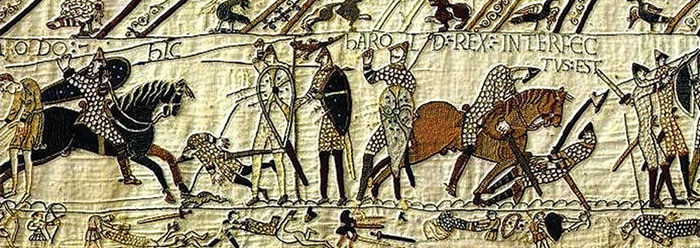How are two famous Viking battles in 1066 related to the very first Christmas?
Both prove God’s providence. At the first Christmas, God so loved the world that He gave us the living Word of God—Jesus Christ. In the Viking battles of 1066, however, God providentially advanced global transmission of the written Word of God, and it is the written Word that teaches us who Jesus is. Every Christmas reminds us of God’s providence.
Before analyzing the events of 1066, let us consider five witnesses that testify for God, with special attention to the fifth one—how God gives an authoritative witness of Himself through His work in providential history.
Five Witnesses Testify for God in the Courtroom of Life
The Bible recognizes at least five witnesses for God, and the truth of those witnesses is strong enough proof to condemn those who oppose their testimony.
1. The physical creation. Although the physical creation does not speak with human language, it provides proof of God’s creatorship and glory (Psalm 19:1-6). Its message is so powerful that to ignore it is to reject God’s revelation “without excuse” (Romans 1:20). Note that no one needs to “assume” God’s existence in order to be confronted with the irrefutable testimony of creation—the proof is physically a part of us! The physical creation, including our own bodies, tells us that there is a glorious Creator, regardless of whether we want to believe it.1
2. The non-physical uniqueness of mankind (i.e., our souls, personalities, minds, etc., especially our morality-oriented consciences). Why do humans have a unique quality of discerning morality, as illustrated in how we instinctively judge and blame one another for immoral behaviors? We display our consciences when we say things like “that’s not fair,” or “that’s not right.” These expressions are proof of our capacity for moral judgment, a non-physical creature quality that is inexplicable apart from our being created in God’s image (Romans 2:1-3, 14-15).
Mankind’s concern about morality—caring about what is “right” or “wrong”—has no adequate extra-biblical explanation. The only satisfactory explanation is that mankind (even though fallen) was made in God’s image, and we cannot exist apart from our Creator who conscientiously discerns between right and wrong, good and bad, true and false. Although human consciences are not infallible, they can provide a strong enough message to convict and condemn hypocrisy (John 8:9; Romans 2:14-15).
3. The Holy Bible. The God-breathed Scriptures provide us with God’s most authoritative witness of truth (2 Peter 1:16-21; 2 Timothy 3:15-16; Psalm 119; Matthew 4:4). The Scriptures are one huge “text message” from God to us. Unlike the witness of nature—which is fallen, non-verbal, and non-redemptive—the Holy Bible provides us with God’s truth that is theologically comprehensive in scope and word-perfect in detail. Its original texts in Hebrew, Aramaic, and Greek are infallible, even to every jot and tittle (Matthew 5:17-18; 24:35).
Amazingly, Peter recognized that his eyewitness experience of the Lord Jesus being physically glorified atop the Mount of Transfiguration—as authoritative as that revelation surely was—was not as sure or reliable a truth revelation as the Scriptures, which God has given to us in written form. Although Peter’s experience was certainly unforgettable, his sensory perceptions and memory were no substitute for the verbalized certainty of the prophecy-verified Scriptures (2 Peter 1:16-21). With truth transmission in mind (Isaiah 55:10-11), God utilized selected Jewish men for receiving, preserving, and transmitting His written Word to the apostle Paul’s generation (Romans 3:1-2).
4. The Lord Jesus Christ Himself. When He came physically to earth, Jesus was God’s witness of truth (Revelation 1:5). As Immanuel—“God with us”—Jesus was Truth in person (John 14:6), the living Word of God (John 1:14; 1 John 5:7; Revelation 19:13). During Christ’s roughly three decades on earth—from His miraculous conception inside Mary, to His birth in Bethlehem (that we annually celebrate as Christmas when we keep in mind that He is the reason for the season), to His adult ministry, crucifixion, burial, resurrection, post-resurrection ministry, and ascension—Christ’s first advent was one infinitely powerful revelation of God. Its unending effects are illustrated by the calendars of today’s world. Even atheists are forced to keep time based on global calendars that divide human history “before Christ” and anno Domini (year of our Lord)—a daily reminder that one unique life has changed all of human history more than any other.2
That accounts for four of God’s witnesses of truth: the physical creation, the unique qualities of mankind’s non-physical humanity (including the uniquely human conscience), the written Word of God (i.e., the Bible), and the living Word of God (i.e., Christ’s historical incarnation and earthly ministry).
5. God working in providential history. But one more witness must be recognized, even though it is quite fallible and not inerrant. This last witness is “hidden in plain view” (like God’s providential actions reported in the book of Esther)—God working in the lives of humans, what some have called providential history, or what the apostle Paul called human “epistles” (2 Corinthians 3:1-3) “known and read of all men.”
In other words, the holy work of God in our lives is a sort of “Bible paraphrase” witness—others watch our lives, wondering if our beliefs affect the way we live.
Obviously, our lives are not infallible or inerrant, so we are not authoritatively perfect truth witnesses for God. But, because the message of our lives is so important to God (Acts 1:8), we have no excuses for not trying to be the best “Bible paraphrases” we can be to the watching world. Consider how the prophet Daniel condemned Babylon’s king Belshazzar, some 2,500 years ago. Daniel did not allude to Scripture, or the witness of heaven, or mankind’s uniqueness, or Messiah’s incarnation. Rather, Daniel recited providential history—a few historical facts that evidenced God working in the life of Nebuchadnezzar—and that “living epistle” witness alone sufficed to doom Belshazzar:
And thou his son, O Belshazzar, hast not humbled thine heart, though thou knewest all this. (Daniel 5:22)
The witness of God’s providential working in Nebuchadnezzar’s life was a truth witness that Belshazzar was morally accountable for, and he was judged by God accordingly.3 Even fallible witnesses can provide strong enough proof that there is no excuse for sidestepping the evidence that they clearly provide. (Ask Belshazzar!)
How Do Viking Battles Show God’s Providence?
How are Viking battles in 1066 relevant to God providing His Word to the world? To recognize God’s providential workings, we should review a few critically important historical facts in light of the biblical doctrine of human mortality.
Scripture teaches that God sovereignly controls who lives and who dies, including when and where (Psalm 68:20; Psalm 102:18; Psalm 139; Matthew 10:29-31). Thus, whether someone lives long enough to perform a world-changing action is a matter that God providentially controls.
Whenever an observable series of cause-and-effect events change the destiny of the world, such “domino destiny” serial events are not random acts of blind chance; they are all foreknown (if not very actively orchestrated) by God as part of His sovereign control over history (Romans 8:28). It is God’s foreknowledge, especially, that staggers the sanctified imagination when we consider how God is and has been controlling the timing of human procreation events.
Two historical examples can illustrate how God’s foreknowledge synchronizes with His purpose of blessing the world with His written Word, which reveals to us the living Word.
First, consider the importance of the United States of America as a gospel ministry vehicle, blessing the whole world by publishing and distributing Bibles, translating the Bible into hundreds of languages, providing biblical education in various media, and sending Bible-teaching missionaries and so on. Surely God’s blessings have been shown to all the world in the past 200 or so years through Christian Americans using their religious liberties. Surely God worked providentially in the founding of America. 2, 4
But what if there had been no George Washington to “father” America? Would American history have noticed the difference? If your answer is “yes,” you appreciate Washington’s impact. How would America have impacted the world (for good) if Washington had never been born? His fate was at mortal risk on October 14, 1066, at the Battle of Hastings, where his own forefather the Norman duke William succeeded in conquering England. If the battle had gone the other way and William the Conqueror had died, then he would not have been alive to have a son named Henry (England’s Henry I), who was born two years after the Battle of Hastings. Since George Washington is a direct descendant of Henry I,5 Washington wouldn’t have been born roughly 700 years later. 6
Second, consider the worldwide impact of the King James Bible (over 400 years old, with over one billion copies in print) and its historical impact on English-speaking peoples around the world. Surely God worked providentially in the political sponsorship of the Bible.
But what if there had been no King James to sponsor the King James Bible? At the previously mentioned Battle of Hastings, the losing king was England’s Harold Godwinson. Just 19 days earlier, King Harold defeated a huge Viking invasion near the Humber River in the Battle of Stamford Bridge on September 25. In that battle, the future destiny of James Stuart (later Britain’s King James)—who would not be born for about 500 years—hung in the balance, subject to God’s procreative providences (Psalm 102:18). The invasion was led by a direct ancestor of King James, the Viking king Harald Hardrada of Norway, who assaulted the English coasts with thousands of Viking warriors and local allies who opposed King Harold Godwinson’s regime.
Hardrada had already won battles in Russia, Eastern Europe, Greece, Italy, Sicily, Jerusalem, Scandinavia, and the British Isles. But on September 25, 1066, with a fleet of about 300 Viking ships, Hardrada invaded eastern England, only to meet Harold Godwinson at Stamford Bridge. At the end of that wasteful, bloody day, only about 8 percent of the Norwegians survived, and only 24 ships were needed to carry them home.
Thankfully, for all who appreciate the King James Bible and its impact around the world, one of those few survivors was Olaf Kyrre, King Hardrada’s son. Kyrre had been assigned to guard the boats during the disastrous battle. About seven years later, he fathered Magnus Bare-legs, through whom descended King James.7
So, how is the first Christmas related to two famous Viking battles in 1066?
Both demonstrate God’s providence. Christmas introduced Jesus, the living Word of God. Later, the two battles of 1066 included God’s providential protection of the lineages of two men who would help spread to the world the written Word of God: King James and George Washington. It is the written Word of God that teaches us to worship the living Word of God—Christ, the reason for this holy season.
References
- Johnson, J. J. S. 2011. Quintillions of Creation Witnesses: Blood Service Agents Testify for Creation. Acts & Facts. 40 (5): 8-9.
- Robbins, J. W. 2003. Christ and Civilization. Unicoi, TN: Trinity Foundation, 5-6, 37-46.
- Johnson, J. J. S. 2009. The Graffiti of Judgment. Acts & Facts. 38 (4): 4-5.
- Eidsmoe, J. 1987. Christianity and the Constitution. Grand Rapids, MI: Baker Books, 362-363.
- F21, to be specific. Pursuant to biogenetic history convention, “filial” (direct descendant) generations are denoted as follows: F1 (child), F2 (grandchild), F3 (great-grandchild), etc.
- Andrusko, S. M. et al. 1983. Genealogical Research at the Library of Congress. Library Trends. 32 (1): 51-65, esp. 53. See also Ashley, M. 1998. The Mammoth Book of British Kings and Queens: The Complete Biographical Encyclopedia of Kings and Queens of Britain. New York: Carroll & Graf Publishers, 439, 497-504, 521. British historian Dr. William R. Cooper provided helpful scholarship with this biogenetic data analysis.
- King James was an F17 descendant of Magnus Bare-legs. Ashley, The Mammoth Book of British Kings and Queens, 420, 433, 459, 548, 557, 578.
* Dr. Johnson is Associate Professor of Apologetics and Chief Academic Officer at the Institute for Creation Research.
Cite this article: Johnson, J. J. S. 2012. Christmas, Vikings, and the Providence of God. Acts & Facts. 41 (12): 8-10.

















